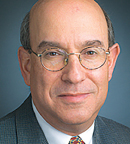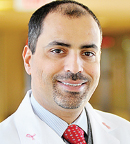
Myles Brown, MD
Myles Brown, MD, Director of the Center for Functional Cancer Epigenetics at Dana-Farber Cancer Institute, Boston, suggested the failure of the endocrine therapy to increase the pathologic complete response rates “may be related to the fact that the aromatase inhibitor was not the optimal endocrine therapy to block the signaling mediated by HER2”—a point that Dr. Rimawi acknowledged as “very valid.” Dr. Rimawi agreed that more complete blockade of the estrogen receptor may be needed.
Carlos L. Arteaga, MD, the Donna S. Hall Chair in Breast Cancer Research and Director of the Center for Cancer Targeted Therapies at the Vanderbilt-Ingram Cancer Center, Nashville, put the results into perspective at a press briefing. He noted that in estrogen receptor–positive/HER2-positive patients, achievement of pathologic complete response is less relevant than for some other subsets. “It does not have the same prognostic and predictive implication,” declared Dr. Arteaga. “The biology of these tumors suggests they may need longer durations of neoadjuvant therapy than that in NSABP B-52, to get to a higher rate of pathologic complete responses. Also, these patients will receive endocrine therapy after surgery for at least 5 years anyway. The inability to achieve a pathologic complete response does not necessarily mean these patients with estrogen receptor–positive tumors will not do well,” he pointed out. “We need a new metric [for outcomes] in this population. And we urgently need more research in de-escalating treatment in these patients.”

Eric Winer, MD
Eric Winer, MD, of Dana-Farber Cancer Institute, Boston, applauded the study’s efforts to find a means of overcoming the resistance pathways believed to impact outcomes in the estrogen receptor–positive/HER2-positive subset of patients. “Given the strong preclinical data [for this approach], the tantalizing clinical data, and the current findings—which are essentially negative—I would not want this study to end this line of investigation, that is, exploring the role of endocrine therapy in conjunction with anti-HER2 therapy,” he commented.
Dr. Rimawi assured listeners that his correlative studies are exploring many avenues. “The trick is to identify patients who may not need anything more than anti-HER2 therapy and endocrine therapy. The role of mutations, tumor-infiltrating lymphocytes, specific HER2 content—these and other factors will probably need to be taken into consideration for the upfront selection of patients who don’t need more therapy. We can then focus on the patients who do need more.” ■
Disclosure: Drs. Arteaga and Brown reported no potential conflicts of interest. Dr. Winer has received grant support from Genentech.


